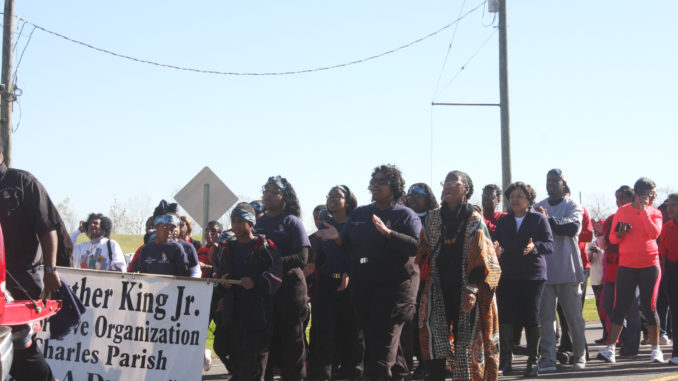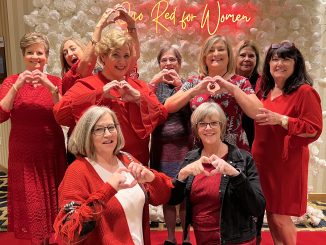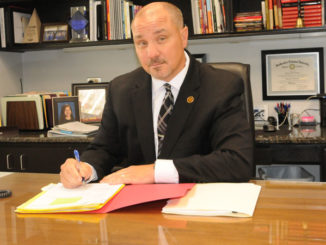
Monday’s march highlights gains in road to equality
Lifelong St. Charles Parish resident Edward Murray was only 11 years old when Dr. Martin Luther King Jr. was shot.
“It was mind blowing for somebody to try and help you, and then somebody [takes] his life for no good reason,” Murray said.
Murray was among roughly 425 people who took part in a recent march organized by the Martin Luther King Jr.
Commemorative Organization of St. Charles Parish in honor of the Reverend Dr. Martin Luther King Jr.’s birthday.
According to Councilman Jarvis Lewis, the marches have been occurring “at least as long as I’ve been alive.”
Lewis is 25.
The march ended with a speech at the Hahnville courthouse. There, winners of a Martin Luther King Jr. essay contest, coordinated by St. Charles Parish Schools, were also announced. Winners were selected in three different age categories.
Among the performers in the march were children from the Bell Baptist Church. These kids, like Councilman Lewis, have never known a life without the Civil Rights Act of 1964 or the Voting Rights Act of 1965. In preparation for the march, the children stood in a row like a military parade, at one point rehearsing a rendition of “Wade in the Water.” The song was a code used by members of the underground railroad to warn escaping slaves to get off the trail an into a stream to avoid the slavecatchers’ dogs.
“It’s important that [the kids] know the sacrifices that others have made to help them,” said St. Charles District Attorney Joel T. Chaisson, who attended the march. “It’s just great to see these young people out here celebrating the holiday for Dr. King.”
Monday’s march was spearheaded by Kamau Odinga. Odinga, now 67, was born under a different kind of racial oppression—that of the British, while living on the island of Trinidad. A resident of Hahnville since 1978, Odinga rallies under the flag of “Pan-Africanism”—the idea that people of African descent are united beyond borders.
“I think there has been some progress—people’s minds have been touched, people have traveled, people have been exposed to more progressive materials,” Odinga said. “But it’s really disheartening that sometimes you make one step forward and two steps backwards.”
Odinga pointed to electoral differences in Louisiana as one example of a continuing rift between black and white residents of Louisiana. In the election that ousted long-time Democratic Senator Mary Landrieu, winner Bill Cassidy captured only 5 percent of the black vote.
Murray echoed Odinga’s comments, saying that great progress had been made since King’s day, but the parish still had “a little ironing out to do.”
“I’m looking at it right now in the school system, that’s where it’s worst,” Murray said.
For Odinga, the marches are one piece to a bigger puzzle of equality.
“We have a saying in the pan-African community: ‘a luta continua,” Odinga said. “The struggle continues.”
Elected officials, meanwhile, cast a brighter light on the ages old struggle for equality.
“St. Charles Parish is a great place to live and raise a family—the racial tensions of the past have, in my opinion, subsided, and it’s a community for all,” Chaisson said.
“I don’t find myself in a position to say the racial relations are ‘bad’ in St. Charles Parish,” Lewis said. “I’ve grown up with friends of every different race—I’ve never been treated different because of who I am or the color of my skin.
“I’ve talked to my grandparents, uncles, great uncles–they told stories of having good relationships across the races,” Lewis continued. “You know, there were times when they may not have been able to go in the same places, but they still had friends who were white and otherwise.”
For everyone present at the march, the future was just as important as the past. Kimberly Brown, a 31-year-old drill instructor leading the kids from Bell Baptist Church, emphasized that it was important to set an example for kids and to “be productive.”
“We’ve got so many new things that’s happening with new elections. People’s awareness has gotten better, we just need to improve on that. It could be so much better, but it has gotten better than what it was,” Brown said.
For most, however, this day is more about tradition than it is about differences. Lewis said that it’s important to remember,that Dr. King and the struggle for civil rights was an “integral part of American history.”
“It’s incredibly important and incredibly significant that anyone and everyone who can access this information does,” Lewis said.




Be the first to comment